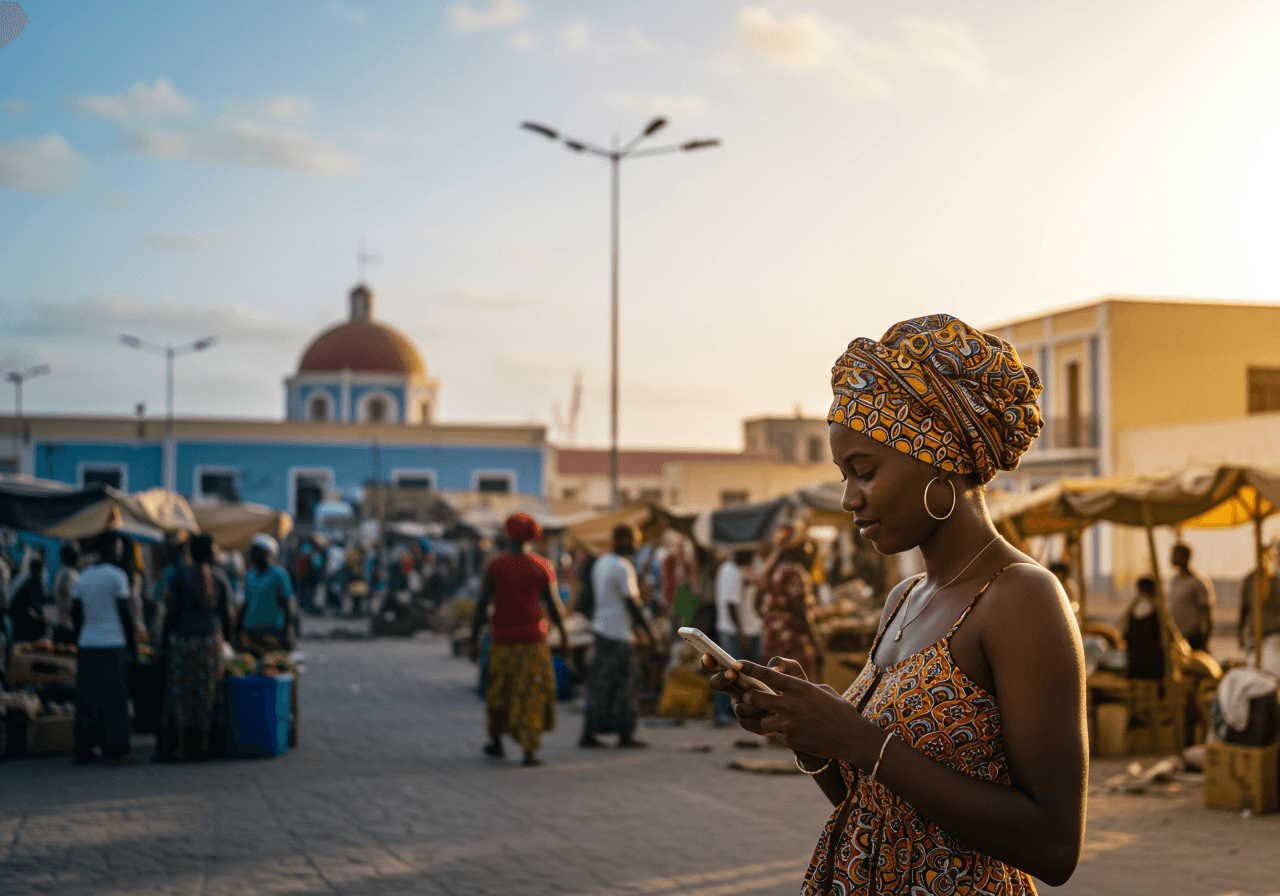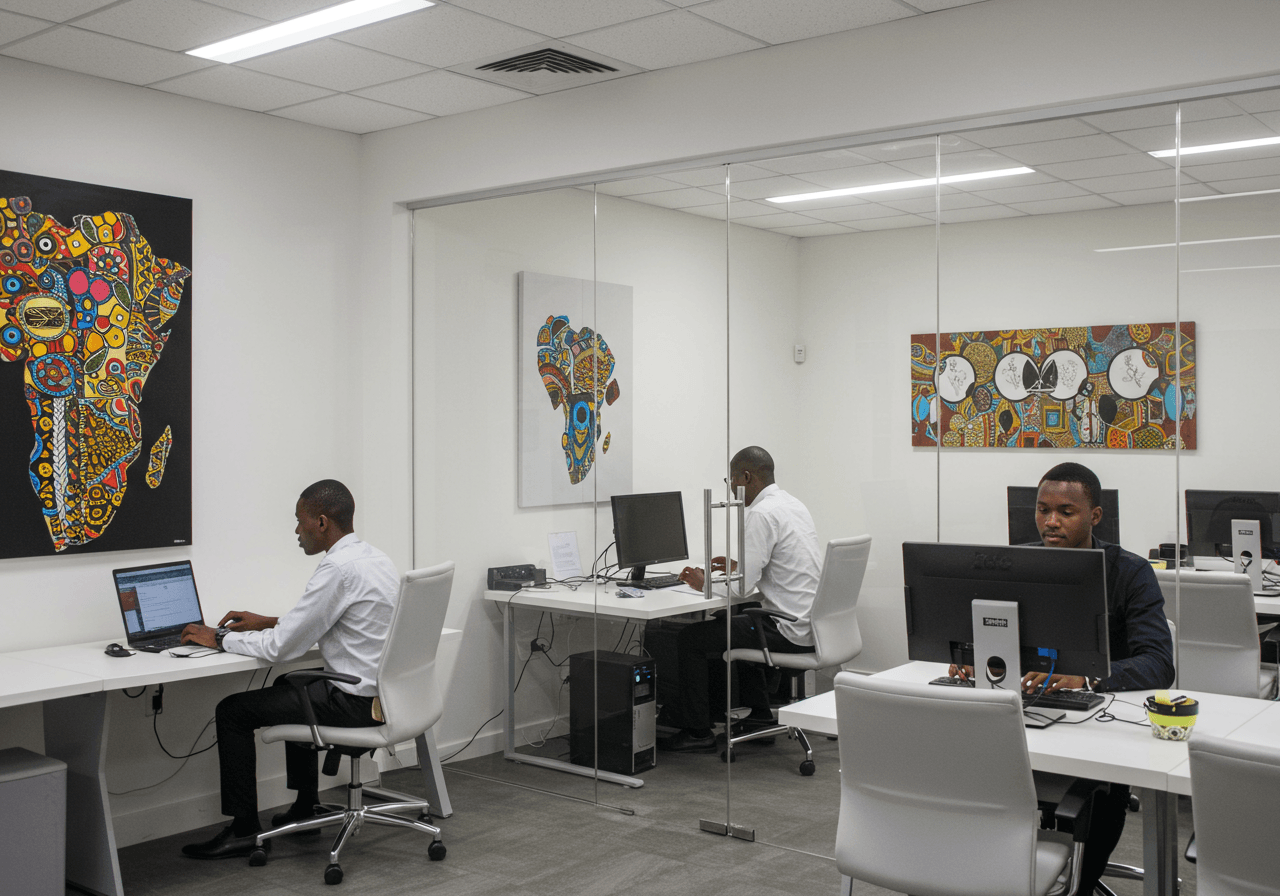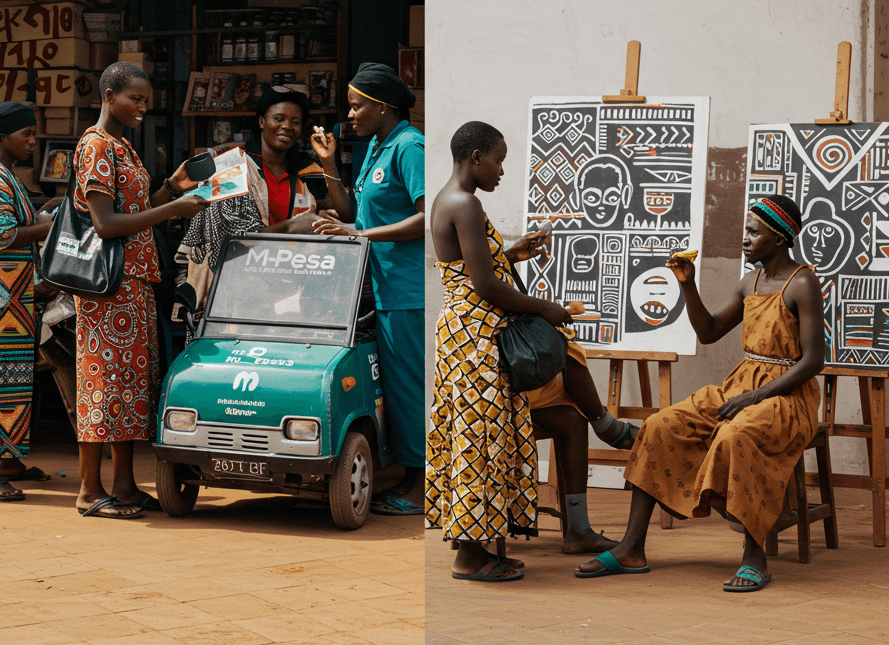Embracing the AI Revolution: Africa’s Path to Innovation and Sovereignty
Discover how Africa is forging its own path in AI, prioritizing human-centered solutions and local ownership over the global tech race.
PRAIA, Cape Verde—The harmattan wind whispers through the open windows of Bonako, my friend's office in Palmarejo, carrying scents of sea salt and distant dust. The midday sun bathes the city in a golden glow. A laptop in the corner drones on about the U.S.-China AI rivalry, a world away from the grounded energy here. As our meeting ends, my gaze drifts to a young woman in a pano headwrap. She taps her phone, her laughter mingling with the hum of midday traffic. She’s a market trader, juggling orders and payments—her version of AI isn’t sci-fi, but a tool to outmaneuver tomorrow’s uncertainties. This is Africa’s AI playbook: skip the arms race, solve the Tuesday problems.

Here, where innovation has long been born of necessity, the question isn’t whether AI will reshape societies—it’s how Africans will harness it to write their own rules, weaving it into the fabric of their textured cultures.
The pulse of this innovation is everywhere. In Nairobi, a young man navigates the bustling Gikomba Market, his phone guiding him to the best deals. He taps M-Pesa’s AI-driven loans, transforming his small wooden kiosk into a thriving store, one transaction at a time. In Kigali, a nurse, her face etched with the weight of responsibility, checks Babyl Health’s latest report. The AI's prediction of a malaria surge in her district gives her precious time to stock the clinic—and perhaps save lives. And in Praia, the capital of Cape Verde, policymakers are actively laying the groundwork for a future where AI can thrive.
The Global AI Race: An African Lens
While Washington debates trillion-dollar investments and Europe polices AI ethics, Africa’s approach is less about rivalry, more about reinvention. Rwanda’s AI policy, the first of its kind on the continent, boldly skips self-driving cars to focus on the pressing realities of farming and maternal health. Kenya’s “Silicon Savannah” fizzes with startups like Ilara Health, where AI interprets ultrasound scans, empowering midwives in remote Kakamega County to provide care once unimaginable.
Yet, a chasm of funding persists. African AI ventures secured less than 1% of global investments last year. “Why chase Silicon Valley’s moonshots,” asks Amina Adekunle, a Lagos-based coder training AI to detect fake pharmaceuticals, her voice crackling over a Zoom call, “when our ‘moonshot’ is a nurse who can finally take her lunch break, or a mother who knows her child is safe?”
Africa’s Silent Architects: AI Agents
The real transformation lies in the mundane, the everyday. In Accra, a grandmother, her hands gnarled with age, sells her intricate handmade beads via WhatsApp. Her orders are potentially managed by a silent, invisible AI agent, tracking payments, inventory, and shipping with quiet efficiency. In Cape Town, Lelapa AI’s “virtual assistants” parse isiXhosa voice notes from rural clinics, digitizing patient histories with a nuanced understanding of local dialects that no foreign algorithm could ever grasp.
And here in Praia, Assisfy, Cape Verde's sole AI startup, is quietly building a foundational infrastructure layer to support future AI deployments. "No one here cares about AGI," says Williams, Assisfy's co-founder, leaning back in his chair, the hum of servers a constant backdrop.
"Our AI needs to handle shift changes and stockouts first—but first, we need laws that let us scale without drowning in red tape." "We're not just building code," he adds, "we're building a future where technology serves the people, not the other way around."

When Machines Elevate Us
Johannesburg artist Lindiwe Mokoena still remembers the sting of criticism when she first used AI to animate her ancestral Ndebele patterns. “Purists called it cheating,” she chuckles, her studio now a captivating mosaic of swirling digital murals.
“But the machine doesn’t know the stories behind these shapes—the weddings, the funerals, the droughts we survived. I use AI like my grandmother used a loom: to weave faster, to bring the old ways into a new light, but the soul, the story, that is still mine.”
This duality—honoring tradition while embracing innovation—defines Africa’s AI moment. At Kenya’s M-Pesa, algorithms expertly flag fraudulent mobile payments, but trust is built by agents like Mercy Kiptoo, who patiently coaches market traders on digital finance under a Nairobi overpass, her smile as reassuring as the shade of the acacia tree above them. “The AI spots risks,” Kiptoo tells me, her ledger filled with a mix of handwritten notes and digital printouts. “But it’s my smile, my human touch, that earns their trust, their savings.”
The Invisible Shift
Africa’s readiness hinges on three quiet revolutions. In Nigeria, new laws mandate that health and civic data used to train AI models stay on local servers, a bold move to shield them from foreign exploitation and ensure they reflect the needs of the people they serve. In Cape Verde, lawmakers debate a Digital Governance Act, a framework poised to integrate AI into public services, education, and small-business growth—a digital morna, if you will, a song of progress played on the strings of technology. And across the continent, collectives like Masakhane teach algorithms to think in Yoruba, Swahili, and Kinyarwanda—ensuring they reflect the deep, communal ethos of Ubuntu.
"We're not just coding," says Kwame Asare, a thoughtful Accra-based engineer, as he audits an AI built to allocate microloans. "We're embedding fairness into machines, ensuring they honor our values, our traditions of sharing and collective responsibility."

More Humanity, Not Less
The threat isn’t AI dominance by foreign powers, but missed chances to define our own path, to shape this technology in our own image. When Babyl Health partnered with Rwanda’s government to predict malaria outbreaks, they didn’t blindly copy Silicon Valley—they meticulously trained their models on local clinic data and wired alerts to the phones of village elders, the traditional guardians of community health.
“In the West, people fear machines replacing hugs,” reflects Pacifique Niyitanga, a Kigali entrepreneur, his eyes fixed on the bustling street below. “Here, we’re using AI to deliver medicine, to free up our nurses so they have *more* time to hold hands, to offer comfort, to be human.”
Conscious Code
The future whispers through the chaotic symphony of Lagos traffic jams, where drivers debate AI ethics over steaming plates of roasted plantain. It thrives in the rhythmic sway of fishing boats returning to Praia’s harbor, where fishermen and engineers huddle, discussing how AI can optimize port logistics, their voices mingling with the cries of gulls. It flickers in the determined eyes of teens in Nairobi slums, hunched over glowing screens, debugging algorithms by the flickering light of a candle, their dreams as bright as the code they write.
Africa’s lesson to the world? It is not about faster processors or bigger data. It is this:
Automate the mundane. Elevate the human. Embrace technology, but on our own terms, guided by our values, our stories, our souls.
We are not racing to out-code the globe. We are building a world where algorithms serve communal fires, not corporate firesales; a world where technology amplifies our humanity, a world where the future is not something that happens to us, but something we build, together, under the vast African sky.
--written by: George Ayinde
